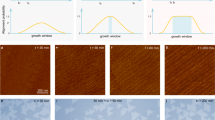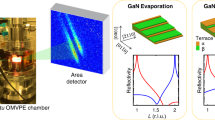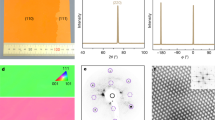Abstract
IN a recent discussion of oriented overgrowth, Sir George Thomson1 has pointed out that near equality of spacing of atoms in the two crystals in contact is not always a necessary condition for such growth to occur. It appeared that the presence of cracks or steps in the mother crystal plays an important part. Some evidence for this belief was the observation of Andrade and Martindale2 that small crystals of gold or silver grown on glass and diamonds show a preference for nucleation on cracks or scratches on the surface.
This is a preview of subscription content, access via your institution
Access options
Subscribe to this journal
Receive 51 print issues and online access
$199.00 per year
only $3.90 per issue
Buy this article
- Purchase on Springer Link
- Instant access to full article PDF
Prices may be subject to local taxes which are calculated during checkout
Similar content being viewed by others
References
Thomson, G. P., Proc. Phys. Soc., 61, 403 (1948).
Andrade, E. N., and Martindale, J. C., Phil. Trans. Roy. Soc., 235, 69 (1936).
Royer, L., Bull. Soc. Franc. Miner., 51, 7 (1928).
Sloat, C. A., and Menzies, A. W. C., J. Phys. Chem., 35, 2005 (1931).
Author information
Authors and Affiliations
Rights and permissions
About this article
Cite this article
JOHNSON, G. Oriented Overgrowth of Alkali Halides on Metals. Nature 166, 189–190 (1950). https://doi.org/10.1038/166189a0
Issue Date:
DOI: https://doi.org/10.1038/166189a0
Comments
By submitting a comment you agree to abide by our Terms and Community Guidelines. If you find something abusive or that does not comply with our terms or guidelines please flag it as inappropriate.



